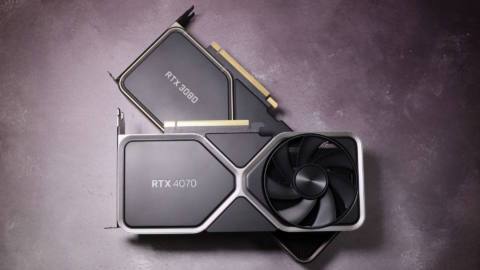One of Taiwan's leading financial news media, UDN, is claiming that Nvidia is heavily reducing the production of its high-end RTX 40-series graphics chips in preparation for the launch of the Blackwell-powered RTX 50 range. However, the reduction is claimed to be so large, by as much as 50%, that prices for RTX 4070, 4080, and 4090 graphics cards will almost certainly increase.
Designing and developing new GPUs costs billions of dollars, so when a new generation of processors is only a few months away, companies like Nvidia will ease off on producing last-gen products, to ensure retailers' inventories aren't full of cheap, old stock. It's been that way for as long as there have been PC graphics cards, so the report from Taiwan's UDN (via TweakTown) claiming that high-end RTX 40 series GPU production is being scaled back isn't exactly headline news.
However, in this instance, UDN is claiming that the reduction of AD102, AD103, and AD104 chip manufacturing could be 30% or as high as 50%. If it's the latter, it will have a notable impact on RTX graphics cards currently in stock.
While the RTX 4070 and RTX 4080 didn't sell very well at launch in April 2023 and November 2022 respectively, Nvidia has shifted a fair number of them of late. That's partly because high-end GPUs, even ones designed just for gaming, are being snapped up to power small-scale AI servers.
The RTX 4070's price reduction, with the appearance of the RTX 4070 Super, and the RTX 4080 getting replaced entirely by the cheaper 4080 Super also helped sales.
This is why it's still relatively hard to find either card below their MSRPs, though you can find some GPU deals if you know where to search. So with demand still high, a reduction in availability will only lead to one thing and that's prices getting bumped up by third-party vendors.
The big drop in production is almost certainly indicative of Nvidia getting ready to announce the Blackwell-powered RTX 50 series, probably in September as it usually does, with the new products reaching shelves in late October, early November.
But if the current RTX 40 series ends up being hit with quite a big price rise, PC gaming enthusiasts are probably going to hold off on buying a new Nvidia card until the RTX 50s are available. If that happens, then all that old stock isn't going to be cleared enough and retailers are going to be stuck trying to sell pricey last-gen models at the same time as pricey new-gen cards.

Best CPU for gaming: The top chips from Intel and AMD.
Best gaming motherboard: The right boards.
Best graphics card: Your perfect pixel-pusher awaits.
Best SSD for gaming: Get into the game ahead of the rest.
Hopefully, some common sense gets applied all around. RTX 5070 models probably won't appear until January 2025 so there's no major call for the current RTX 4070 lineup to be heavily scaled back. If the production decrease is kept under a drop of 30%, it perhaps won't result in a big price hike or any price increase at all.
All this assumes, of course, that AMD and Intel don't steal some of Nvidia's thunder by launching their next-gen RDNA 4 and Battlemage GPUs toward the end of this year. If they do and their prices are very competitive, then Nvidia may be forced to lower the RTX 40 prices to maintain its market share.
I know this is all ifs, mights, and maybes—UDN is a reliable source for such information but the range in the manufacturing reduction is pretty big—but you can be sure of one thing, at least. Nvidia's RTX graphics cards aren't suddenly going to become a whole lot cheaper. Let's just hope they don't suddenly go the other way.






